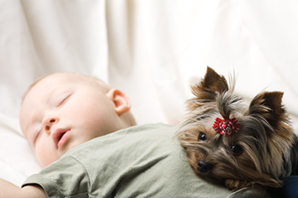Bringing home baby

How do you help your pets adjust to a brand-new member of the family? Hazel Davis, dog-lover and mum of two, shares some advice from her own experiences about how to live together safely and happily.
When I became pregnant with my first child, people gently suggested that our dogs might object to an unannounced arrival - neither is especially known for calmness. Hank, a Terrier cross, and Eric, a Border Terrier, have lovely natures, but they always express themselves at the very top of their voices!
But when Clem came back from the hospital, the dogs just sniffed her and carried on with their day. When she cried, Hank would look at one of us as if to say, 'Well go on, feed it.' Two years on, Eric and Clem are complete partners in crime. Six months ago she went through a phase of holding on to his fur with a firm grip. He took it in his stride, and now she gets a daily face wash. The older Hank ignores her - unless she happens to have food, in which case he becomes a devoted guardian!
But even if you are 100 per cent certain your pet is baby-friendly, there are things you need to bear in mind. Your pet might have previously been the sole recipient of your attention and may find sharing the cuddles something of a shock. So whatever else you do, you need to make them feel completely secure of your love for them.
Nick Honor is a training specialist with the Behaviour Company, and says it's never too early to start preparing a dog for a newborn: 'New toys, blankets, nappies and other paraphernalia should be introduced to your dog as soon as possible, so he can start getting used to these new sights and smells.'
Cats also have keen noses, and should be exposed to the smells that will accompany your baby. Rub a little baby lotion on your hands and then engage your cat in play or strokes, so the scent develops positive associations. When the baby is born, place a used blanket or nappy in a quiet area where your cat can investigate it in private, and realise it doesn't represent a threat.
First introductions
Letting a dog sniff a new baby can be useful, provided that everyone is comfortable. Nick says: 'Dogs live in a world of scent and will probably want to sniff. But I would always recommend fitting your dog with a good basket muzzle during any early interactions.' If your dog isn't used to wearing a muzzle, get him in the habit before the baby arrives.
Nick says that the key is to show the dog that the presence of a baby brings positive consequences: 'Do this by feeding your dog treats when he is in the baby's company, to ease the distress of hearing new and unusual sounds.'
If your dog is particularly boisterous, it could be a good idea to try an anti-anxiety pressure wrap (designed to apply a gentle pressure to the areas of the body that hold tension) and herbal scent diffusers, to relax the dog before the initial meeting.
Newest member of the pack
Some people plan on leaving their dogs with their friends until their baby is settled, but apparently this isn't a good idea. 'It is important that dogs see the baby as part of the pack from the beginning,' says Sarah Linehan from the Pet Experience training company.
'The most important thing is to try to make everything as normal as possible. When the baby first arrives home, behave completely normally towards the dog while instilling boundaries around the baby.'
Cats can pose a different problem, being less receptive to the words 'sit' and 'bed'. But Sarah says: 'Even small furries can get stressed when things change within a household.'
Cats may also respond well to herbal sprays that mimic certain pheromones and help calm them down. Many animal behaviourists recommend creating hiding places for cats, ideally high up and cosy, so they can climb out of a noisy situation and observe from a position of safety. And you should always provide your house rabbit with places to hide when he feels a bit overwhelmed, where curious toddlers can't reach him. Sarah says: 'The most important thing is to give the same amount of attention to all your pets once the baby comes home as you did beforehand.'
Taken from the Autumn 2013 edition of PetPeople magazine.
Do you have any experiences to share about introducing your pets and children? Tell us your stories in the box below.

